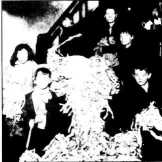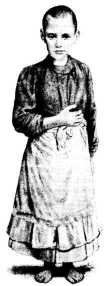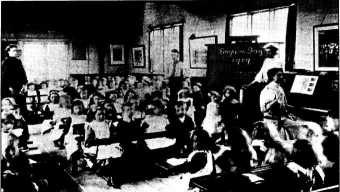
Mother and six children homeworking
Publications Index | Encyclopedia of Trotskyism | Marxists’s Internet Archive
Socialist Review Index (1993–1996) | Socialist Review 180 Contents
From Socialist Review, No. 180, November 1994.
Copyright © Socialist Review.
Copied with thanks from the Socialist Review Archive.
Marked up by Einde O’Callaghan for ETOL.
|
Seen and not heard is the usual expectation of children. However, Michael Rosen’s new book on children’s lives takes a fascinating look through history and cultures, extracts of which are printed below |
SMALL AD
Advertisement to The Tatler, 9–11 February 1709
A Black Indian Boy, 12 Years of age, fit to wait on a Gentleman, to be disposed of at Denis’s Coffee-House in Finch Lane near the Royal Exchange.

|
|
Mother and six children homeworking |
A VISION
A childhood experience of William Blake, c. 1800
At seven years of age I was set to work in the silk mills, where I toiled from five o’clock in the morning till seven at night for the weekly sum of one shilling.
There a remarkable circumstance occurred to me. Afraid of being past my hour in the morning, and deceived by a clouded moon, I frequently rose in the night mistaking it for day. At one of these times, I found all was silent in the mill, and I knew I was too early. As I stood pensively on the parapet of the bridge, I heard the clattering of horses’ feet; and, without turning my head, I asked what it was o’clock. No answer being given I turned to look, and I distinctly saw the appearance of a man, riding one horse and leading another, on the mill-wheel. The clock then struck four, and the apparition vanished.

|
|
Nine-year-old child prostitute of Kiev (1904) |
A COAL-MINER
Front evidence of Margaret Leveston, aged six, East Scotland, 1842, for the Parliamentary Commission inquiry into the state of children in mines and manufactories
Been down at coal-carrying six weeks; makes ten to fourteen rakes a day; carries 56lbs. of coal in a wooden backit. The work is na guid; it is so very sair. I work with sister Jesse and mother; dinna ken the time we gang; it is gai dark. (Notes: rakes: journeys, backit: wooden trough)
GILLIAN WAGNER, CHILDREN OF THE EMPIRE
Between 1870 and 1930, 100,000 children were sent to Canada from Britain.
ORPHAN IVY
An interview with Ivy Petherick, at Muller’s Orphanage from 1910, aged nine
It was like a prison, ingraining the routine into you. We had to be up every morning at six o’clock. We all had to file into the washroom, and there was the tin bowls filled with cold water. There was no talking. Very few broke the rules, but my sister did. She broke the rules, talking to one of the girls, and she had to stand in the passage with her hands on her head, and I think she had to stand there nearly all day ... I thought the end of the world had come. That was the sort of effect it had on you ... Our meals we had to eat off long white tables. And we had porridge for breakfast, and before we could have our porridge, there was a pulpit in the dining-room and a man used to go up and read a portion of the Bible and say a prayer, and we were very hungry. We’d had nothing between five o’clock and the next morning. Now my sister was difficult. She refused to eat the porridge, so they lay her on a form and poured it down her throat, and she spat it at them. She was very wilful, my sister, and a good thing she was, but in my case I was intimidated. Well, she wouldn’t eat it, but in the end she had to give in because she was hungry.

|
|
Schoolchildren being ‘taught’ Empire (1909) |
CHILDREN’S STRIKE
Larry Goldstone recounting a revolt of Manchester schoolchildren, September 1911, in a letter to Stephen Humphries
When I was a lad of ten I used to work after school hours as a lather boy in my elder brother’s barber’s shop. Now, the barber’s shop was a real meeting place for men and sometimes they’d have a big laugh talking about the school strike that they had in their school days.
My elder brother was a very popular young man, real extrovert, and it was him who was the ringleader of the strike at Southall Street school.
You see, the teachers at that time, without any doubt, were sadists. They ruled with fear. They firmly believed in the adage that kids were to be seen and not heard. All they needed was the least excuse and they’d cane you without mercy.
Now when the boys went on strike, they demanded the abolition of the cane, and they also wanted a shilling a week to be paid to the monitors, because they were just used as lackeys. On the big day they met outside the school, over three hundred of them, and they marched to a field opposite the gaol walls of Strangeways. Then they marched along the main road, and threw some stones at the school windows. The strike lasted for three days, but eventually they gave up and returned to school, and all the classes were lined up to witness the punishment of the ringleaders.
My brother said they were held over a desk by their outstretched hands and caned on their bottoms. Now, one of the brothers put a plate inside his trousers, and the blow of the cane broke the plate into pieces, badly cutting the lad’s bottom. But they come unstuck with my brother. When it came to his turn, he took the teacher by surprise, wrenched the cane from his grasp and started hitting him with it, then he ran out of the school and home.
In the evening, when father came home from work, my brother told him about the canings, and the next morning he went up the school with him. He told the headmaster he didn’t approve of the beatings that were carried out at the school, because a lot of the parents were angry when their children told them about the punishments. And he gave the headmaster a strict warning that if anyone dared apply any punishment to his son Jack, then he would go up and mete out far worse to the one responsible. If his lad did anything that required punishment, they were to send a note and he would deal with his son by his own disciplinary methods.
WHAT PARENTS SAYParents irritating sayings, collected
|
THE TWINS
Experiences of Moshe Offer, aged 12 in 1944
I was in Mauthausen for about two or three weeks after the Death March. Then I was put along with other camp survivors on a train bound for I don’t know where.
It was very crowded. I felt a push, and I fell off the train. To this day, I don’t know if it was because I was so skinny, or because someone was trying to save me. In any case, I landed in a field.
I crawled through the field, and I looked up to see a big German in uniform. I started crying and asked him to kill me. I told the Nazi I was a Jew.
But the old German soldier said to me, ‘I won’t kill you – I am going to hide you.’ And so he took me to an attic where they were storing corn and other grain.
This old German soldier was very nice. Every day, he brought me some dry biscuits and water. From the window of the attic, I saw the war coming to an end. I saw trains go by, carrying munitions. I watched German airplanes being shot down and parachutists jumping out – and being shot themselves.
One day, in the middle of the night, I heard artillery fire. After that night, the German didn’t come anymore. I no longer got food or water. And so I began eating the corn and grain.
For four days, I was without any food or water. I was very hungry, very thirsty. But I stayed in the attic because I was also very frightened.
Then one day I looked out of the window and saw a jeep. It was carrying American soldiers. I was so weak, I couldn’t walk, and so I crawled on my hands and knees from the attic to the jeep.
The American GIs spotted me and rescued me. They carried me in their arms to their jeep, and they gave me candy and chocolates.
TOI-TOI
Related by a teacher in Western Cape, South Africa, 1986
A 6-year-old boy said to me, ‘Just watch me jump. I jump very high, eh?’ I said to him, ‘Ja’. And I said to him, ‘But why are you insisting?’ He says, ‘One has to jump high because prison walls are high.’ I said to him, ‘Now, do you think you are going to prison?’ He said to me, ‘Yes, I’m going to prison, because I’m a comrade, and tell the children to come outside. I tell the teacher I’m going to the toilet and I call the children out and I teach them to toi-toi (do the freedom dance) so they’re going to put me in prison.’
POVERTY
In 1990 there were 170 million malnourished children in the world.
In the same year 142 million children were born; 68 percent will be dead before the age of 16. That breaks down into 3 percent from the industrialised world and 65 percent from the developing world.
UNICEF, The State of the World’s Children
HOME, ALONE
Fiona Smith speaking at the annual conference of the Institute of British Geographers, Nottingham, 1994
Approximately a fifth of all five-to-ten year-olds are now left alone after school or in the holidays because both parents are at work. That is some 800,000 children, and unless action on childcare is taken rapidly the figure will only get worse. (The Guardian, 6 January 1994)
The Penguin Book of Childhood, £15.00 from Bookmarks
Socialist Review Index | ETOL Main Page
Last updated: 6 November 2017